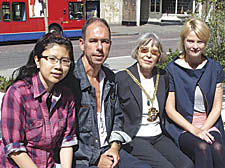|
|
 |
| |

From left, Roro Ambarwati, Mark Fish, Anna Berent, and Charlotte Lock |
Limbo life: refugees who flee torture
Ex-Harley Street psychotherapist reveals dilemma facing £35-a-week asylum seekers
A FORMER Harley Street psychotherapist told a Town Hall meeting how he gave up a lucrative private practice to work with desperate asylum seekers.
Mark Fish is now director of Angel-based charity Room2Heal, which provides psychotherapy for refugees who come to Britain seeking sanctuary.
He described the plight of those who flee the threat of torture or murder but often end up being refused asylum and living for years in “limbo” on “the edge of society”.
Mr Fish, and Charlotte Lock from Finsbury Park-based Medical Foundation for the Victims of Torture, were invited to talk about their work by Islington Mayor Anna Berent.
The Lib Dem councillor will be raising funds for both charities during her year of office.
She revealed that the other 32 London mayors are being invited to visit Islington’s professional theatres on October 14 as part of a fundraising appeal.
Mr Fish described how he gave up his mainstream work in 2001 after realising there was something missing from his life.
He worked with the Quakers, running healing retreats away from conflict zones in northern Uganda. “The leaders of the warring groups were traumatised themselves,” he said. “That’s why they made poor decisions.”
He came back to the UK and launched RoomtoHeal from offices in White Lion Street. His aim was to help asylum-seekers whose situation was often worse than those in Uganda.
Mr Fish said: “Imagine you are suffering from trauma and persecution back home. You come to Britain because you hear it is a land of sanctuary. But having got here you are very often just left in this asylum limbo where you can’t work and have to exist on £35 a week for seven or eight years.
“It is far more debilitating than the original trauma.”
Rather than providing office-based support, Mr Fish tries to get the refugees, including many from Iran, Africa and Afghanistan, out into nearby Culpeper Gardens, where they work on an allotment as part of their therapy.
The government suggests there are 300,000 refugees seeking asylum in Britain, but refugee agencies believe the total might be more like 700,000.
Mr Fish added: “There are great myths about asylum-seekers. For example, it is absurd to suggest they come here to sponge off the country. They can’t go back home because that means torture or death. They are marooned here and they are often highly qualified. Asylum-seekers include doctors, dentists, lawyers and engineers.”
Medical Foundation for Victims of Torture, based in Isledon Road, has been operating since 1985. Ms Lock, its manager, said: “We care for the survivors of torture, including people who have had the soles of their feet beaten or have been raped.”
Roro Ambarwati, a student from Indonesia, described how she helped in the aftermath of the tsunami in 2005. In some areas 70 per cent of the population were washed away in the floods and there were huge post-trauma disorders.
She added: “But at least there was community support. People cared. There was great sympathy. There is little of this for asylum-seekers in Britain.” |
 |
|
|
 |
Your comments:
IT was heartening to read such a positive story this Sunday morning. Good luck to the Mayor of Islington. Charities helping asylum seekers are certainly of vital importance and always short of funds. Good wishes to Mark Fish and all who are trying to help people in such terrible situations. Growing vegetables (and maybe medicinal herbs?) is very therapeutic as well as a good way to eke out the pitifully small allowance given to asylum seekers. I hope this article does not attract the usual series of rants from people who believe all that is in tabloid newspapers, yet who have never met anyone who would rather die here than go back to the country where they were tortured.
J. Fearnley
|
| |
|
 |
|